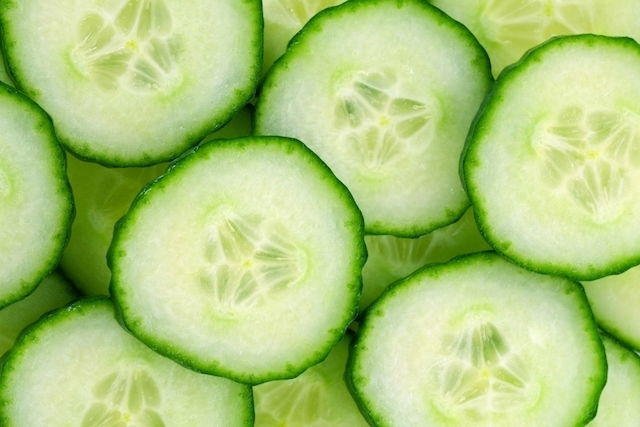Cucumber is nutritious vegetable that is low in calories, but high in water, mineral and antioxidant content. It contain many health benefits, like promoting weight loss, keeping the body hydrated and improving intestinal function.
Cucumber can also reduce fat in the body and bring down blood pressure. Eating cucumbers is recommended for the treatment of atherosclerosis, diabetes and hypertension.
Cucumber is commonly used to refresh and tone the skin, and can be added to salads, juices and face masks.

Health benefits
The main health benefits of cucumber are:
1. Aiding in weight loss
Cucumbers are low in calories and rich in water and fiber. This can help to keep you full between meals for longer, which is why they are commonly added to weight loss diets.
2. Preventing dehydration
Because it is made up of 95% water and because it is rich in electrolytes, cucumber can help to prevent dehydration from physical activity. This vegetable should be consumed in its natural form or added to a refreshing water with mint, for example.
3. Preventing cancer
Cucumber contains great quantities of antioxidants of nutrients, like cucurbitacins, which contain anti-cancerous and antiproliferative properties, which interfere the with the growth of cancerous and pre-cancerous cells.
4. Maintaining cardiovascular health
The fibers and antioxidants present in cucumbers can help to improve cardiovascular health. They promote fat burning, particularly triglycerides and LDL cholesterol. Regular consumption of cucumbers can help to prevent diseases like atherosclerosis, heart attack and stroke.
5. Reducing blood pressure
Cucumbers contain great amounts of water, magnesium, and potassium. This can help to reduce blood pressure, as these components promote vasodilation and help to flush out excess sodium through the urine.
6. Managing diabetes
Cucumbers contain fiber and have a low glycemic index which can help to slow down the speed at which blood sugars rise in the blood. It contains cucurbita, which stimulates the release of insulin to regulate blood sugar levels and manage diabetes.
7. Reducing skin inflammation
Cucumbers that are applied directly to the skin have a refreshing effect that help to keep the skin revitalized. It can also soothe the skin and reduce swelling and irritation to relieve sun burns.
8. Helping to detox the body
Because it contains potassium, water and antioxidants, cucumber can help to detox the body and reduce fluid retention. It facilitates the elimination of sodium and toxins through the urine.
9. Improving digestion
Cucumbers act like an anti-inflammatory in the stomach and help to improve digestion. It can reduce acidity and the formation of gas along the digestive tract.
10. Relieving constipation
Cucumbers contain great quantities of fiber and water, which can help to soften the stools and add bulk to them, They can promote regular bowel movements and improve constipation, ideally when consumed whole with the peel (which is where most of its fibers are found).
11. Improving bone health
Because it contains great amounts of vitamin K, cucumber helps to maintain healthy bones. Together with calcium, vitamin K is important for adequate bone development and maintenance, which is important for the prevention of diseases like osteoporosis.
Cucumber properties
Cucumbers are low in calories (they contain just 15 calories for every 100 g) and is made-up of 95% water. It also contains great amounts of lignans, vitamin C, curcurbitacins, flavonoids, potassium and magnesium. It also has other oligoelements and minerals that boats antioxidant, diuretic, depurative, anti-cancerous, anti-inflammatory, emollient, and anti-diabetic properties.
Nutritional composition
The following table outlines the nutritional composition in 100 g of cucumber:
It is important to remember that to obtain the benefits of cucumbers mentioned above, they should be included in a healthy, active lifestyle.
How to consume
Cucumbers can be eaten raw in salads, juices and smoothies, or they can be pickled to preserve their duration. However, not everyone can easily digest cucumbers, and therefore they can be fully peeled to promote adequate digestion if needed.
Cucumber recipes
Some recipes that can be prepared using cucumbers include:
1. Cucumber water
Ingredients
- 1 large cucumber or 2 small cucumbers
- 1 liter of water
- Mint leaves
How to prepare
Wash the cucumbers and slice. Then add to a jar of water with the mint leaves. Allow to soak for about 1 hour in the fridge to guarantee optimal flavor.
2. Cucumber pickles
Ingredients
- 1/3 cup of apple cider vinegar
- 1 tablespoon of sugar
- 1/2 teaspoon of grated ginger
- 1 cucumber
How to prepare
Mix the sugar, vinegar and ginger until the sugar has completely dissolved. Add the cucumber (sliced thinly with the peel) and soak for at least 2 hours in the fridge before serving.
3. Cucumber detox juice
Ingredients:
- 2 apples, with peel
- 1 medium cucumber
- 3 mint leaves
How to prepare:
Remove the seeds from the apples, then mix all ingredients in a blender. Drink cold, without sweetening.
4. Cucumber salad
Ingredients:
- 4 lettuce leaves
- 1/2 a handful of watercress
- 1 tomato, cubed
- 1 boiled egg
- 1 cucumber, cut into sticks or cubes
- 1 grated carrot
- Olive oil, vinegar, lemon and oregano to season
How to prepare:
Cook the egg and cut the vegetables. Mix all ingredients together and season as desired. Serve fresh as a side for lunch or dinner. If desired, you can add pulled chicken or tuna and consume as a main meal.
